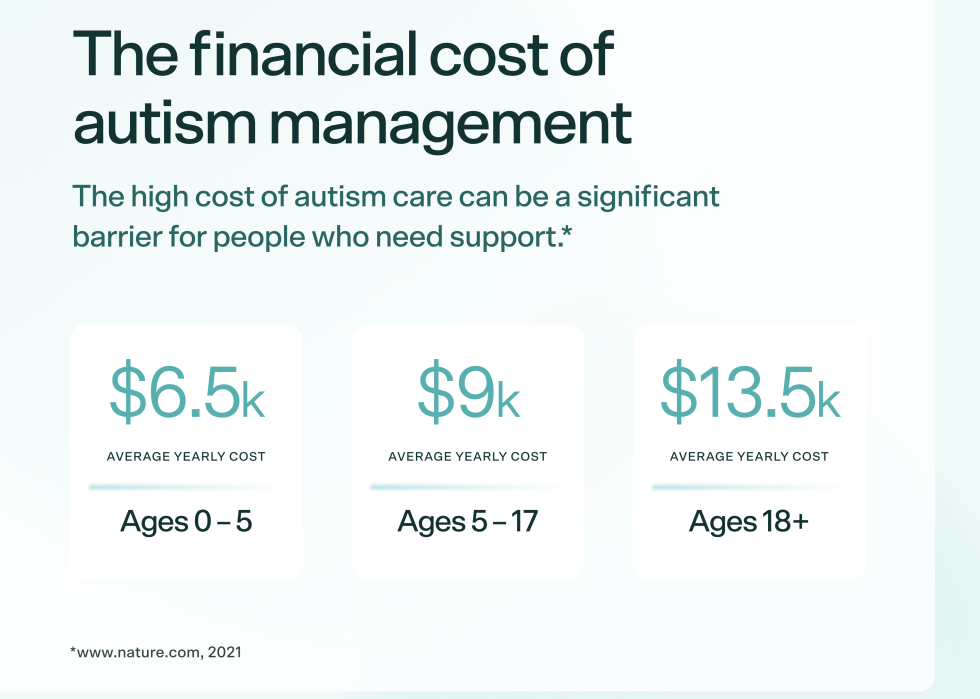The financial cost of autism management: Navigating expenses and resources

When it comes to effective autism treatment, early intervention is key. The sooner a person is diagnosed, the sooner they can receive support. The first step in accessing autism care is to seek an evaluation to determine whether you meet the criteria for ASD.
To get an evaluation, you need to connect with a psychiatrist, licensed psychologist, neurodevelopmental pediatrician, developmental-behavioral pediatrician, child neurologist, geneticist, or an early intervention program that provides assessment services. The cost of this initial assessment can range from $1,500 to $3,000 or more, depending on the provider, location, and insurance coverage. Some government and nonprofit programs may help cover costs for families in need.
Applied behavioral analysis (ABA)
After you receive a diagnosis, the next step is to work with your provider(s) to create a treatment plan. This can include a variety of therapies and other services based on your individual needs. However, one of the most commonly used treatments for people with autism is applied behavioral analysis (ABA).
ABA is an evidence-based intervention that can help people learn new skills and adopt healthy behaviors to improve daily life. The amount of ABA therapy a person needs per week varies, but it typically costs about $120 per hour with a certified provider. And costs can differ depending on provider credentials, location, and insurance coverage.
Here's a sample breakdown of how those costs might add up:
- 10 hours per week of ABA: $1,200
- 20 hours per week of ABA: $2,400
- 40 hours per week of ABA: $4,800
If cost is a concern, check with your insurance provider, and explore financial assistance programs that may help cover expenses.
Other therapies and services
In addition to ABA, there are many other services and supports that can help people with autism. For example, this could include speech therapy, social skills training, parenting classes, occupational therapy, individual therapy, group therapy, and more.
People with autism may also need to work with doctors, nutritionists, physical therapists, and other providers who focus on physical well-being. According to the Centers for Disease Control and Prevention (CDC), the annual cost of these services can add up to thousands of dollars per year.
Finding support for financial costs of autism
If you or someone you love needs autism care and you're worried about how you're going to pay for these services, you're not alone. These services can be expensive. But fortunately, there are a variety of resources that can help ease the financial burden of autism care.
- Health insurance: If you have health insurance, take some time to understand your coverage. Call the number on the back of your insurance card, and ask to review your benefits. It can help to make a list of questions ahead of time, like:
- What types of behavioral therapies are covered?
- Is there a maximum amount my plan will pay for the services?
- Am I limited to a certain number of visits with various providers?
- How do I find in-network providers?
- Do I need to be pre-approved to see a specialist or seek an evaluation?
- Government programs: The government assists people with autism through several programs. These include supplemental security income (SSI), Medicaid, the Children's Health Insurance Program (CHIP), and more. These programs can help make autism care more accessible through no-cost insurance coverage and financial assistance. You may also have access to state-specific autism supports in addition to federal programs.
- Private organizations: Autism Care Today SOS is a grant-funded program that provides financial assistance to help people who have an immediate need for autism care. The Federation for Children with Special Needs provides a variety of services to help eliminate barriers for young people with autism and other healthcare needs.
